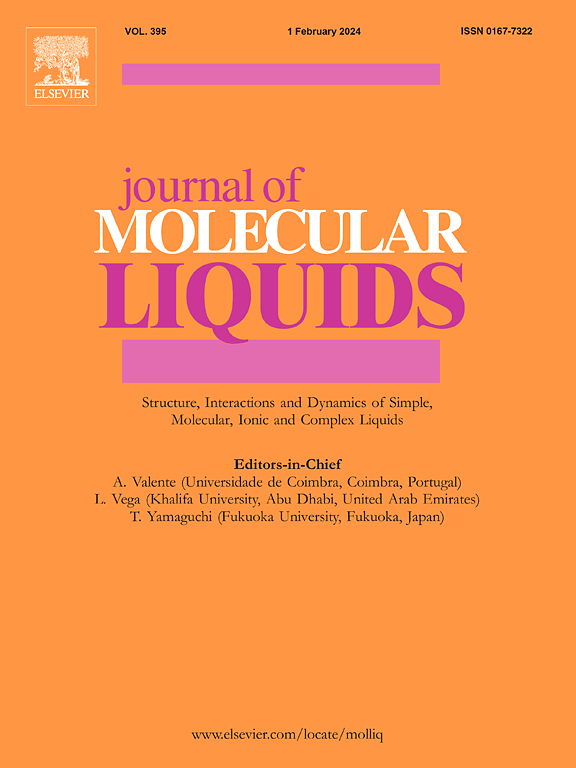Stimulated Pickering emulsion stabilized by binary particles with contrasting wettability and trace surfactant
IF 5.3
2区 化学
Q2 CHEMISTRY, PHYSICAL
引用次数: 0
Abstract
The investigationof self-assembled particle structures at fluid interfaces has gained considerable interest across various fields. In particular, Pickering emulsions (PEs) stabilized by binary particles co-assembling at these interfaces have attracted even more attention. To explore the self-assembly process of superhydrophobic and superhydrophilic particles at oil–water (O/W) interfaces influenced by a trace amount of surfactant, a series of experiments were conducted. A small quantity (0.01 mmol·L−1) of dodecyltrimethylammonium bromide (DTAB) was introduced, establishing a variable stable emulsion system with high salt tolerance, capable of withstanding up to 6 mol·L−1 NaCl, in synergism with the particles. The DTAB concentration required to stabilize the O/W emulsion with particles was as low as 0.001 mmol·L−1. The stability and type of the resulting emulsion could be adjusted by varying the ratio of hydrophobic to hydrophilic particle (R) or by modifying acid/base conditions. The systems exhibited robust cyclic acid/base regulated demulsification and phase inversion behavior, maintaining stability over at least 10 cycles. Results indicated that the stability and nature of the emulsion were influenced by the curvature of the interface formed by the self-assembled interfacial particle structures, arising from the competitive adsorption of both types of particles and trace surfactant. Further analysis revealed a correlation between interfacial curvature and the surface charges of the particles, which could be modulated through DTAB adsorption. This study elucidated the behavior of hydrophilic and hydrophobic particle self-assembly at interfaces, provided a straightforward strategy for co-preparing switchable emulsions using superhydrophilic and superhydrophobic particles, and expanded the range of amphiphilic particles available for producing PEs. This approach presents significant potential for future research and applications in the field of PEs.

由具有不同润湿性的二元颗粒和微量表面活性剂稳定的受激皮克林乳液
对流体界面自组装颗粒结构的研究在各个领域都引起了相当大的兴趣。特别是由在这些界面上共同组装的二元颗粒稳定的皮克林乳液(PEs)引起了更多的关注。为了探索超疏水和超亲水粒子在油-水(O/W)界面上受微量表面活性剂影响的自组装过程,我们进行了一系列实验。实验中引入了少量(0.01 mmol-L-1)十二烷基三甲基溴化铵(DTAB),在与颗粒的协同作用下建立了一个具有高耐盐性的可变稳定乳液体系,能够承受高达 6 mol-L-1 的 NaCl。稳定含颗粒的 O/W 型乳液所需的 DTAB 浓度低至 0.001 mmol-L-1。可以通过改变疏水粒子与亲水粒子的比例(R)或改变酸碱条件来调整所产生的乳液的稳定性和类型。这些体系表现出强劲的循环酸/碱调节破乳和相反转行为,至少在 10 个循环中保持稳定。结果表明,乳液的稳定性和性质受到自组装界面颗粒结构所形成的界面曲率的影响,这种曲率是由两种类型的颗粒和痕量表面活性剂的竞争性吸附所产生的。进一步的分析表明,界面曲率与颗粒表面电荷之间存在相关性,而颗粒表面电荷可通过 DTAB 吸附进行调节。这项研究阐明了亲水和疏水粒子在界面上的自组装行为,为使用超亲水和超疏水粒子共同制备可切换乳液提供了一种简单易行的策略,并扩大了可用于生产聚乙烯的两亲粒子的范围。这种方法为 PE 领域的未来研究和应用提供了巨大的潜力。
本文章由计算机程序翻译,如有差异,请以英文原文为准。
求助全文
约1分钟内获得全文
求助全文
来源期刊

Journal of Molecular Liquids
化学-物理:原子、分子和化学物理
CiteScore
10.30
自引率
16.70%
发文量
2597
审稿时长
78 days
期刊介绍:
The journal includes papers in the following areas:
– Simple organic liquids and mixtures
– Ionic liquids
– Surfactant solutions (including micelles and vesicles) and liquid interfaces
– Colloidal solutions and nanoparticles
– Thermotropic and lyotropic liquid crystals
– Ferrofluids
– Water, aqueous solutions and other hydrogen-bonded liquids
– Lubricants, polymer solutions and melts
– Molten metals and salts
– Phase transitions and critical phenomena in liquids and confined fluids
– Self assembly in complex liquids.– Biomolecules in solution
The emphasis is on the molecular (or microscopic) understanding of particular liquids or liquid systems, especially concerning structure, dynamics and intermolecular forces. The experimental techniques used may include:
– Conventional spectroscopy (mid-IR and far-IR, Raman, NMR, etc.)
– Non-linear optics and time resolved spectroscopy (psec, fsec, asec, ISRS, etc.)
– Light scattering (Rayleigh, Brillouin, PCS, etc.)
– Dielectric relaxation
– X-ray and neutron scattering and diffraction.
Experimental studies, computer simulations (MD or MC) and analytical theory will be considered for publication; papers just reporting experimental results that do not contribute to the understanding of the fundamentals of molecular and ionic liquids will not be accepted. Only papers of a non-routine nature and advancing the field will be considered for publication.
 求助内容:
求助内容: 应助结果提醒方式:
应助结果提醒方式:


